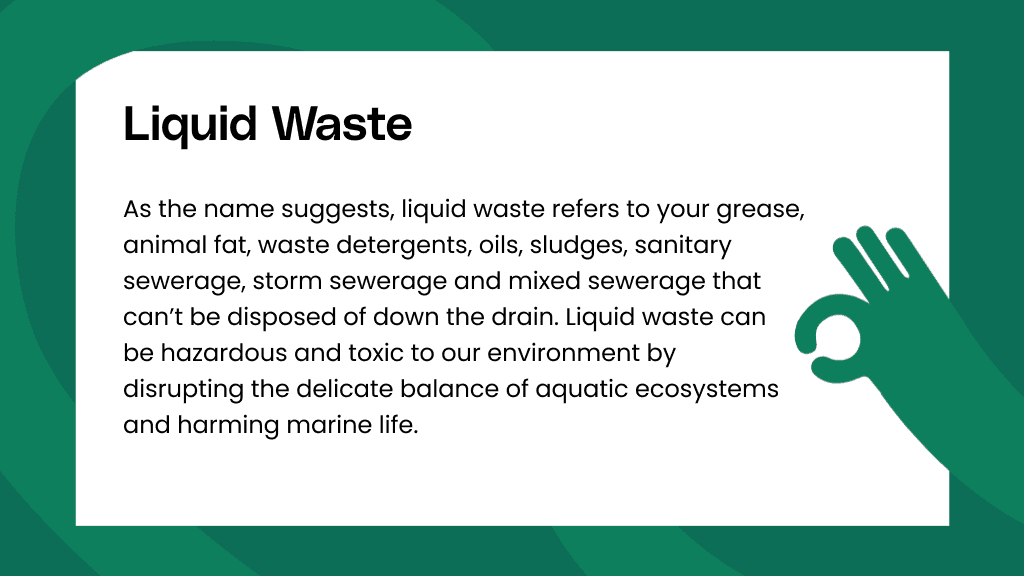The Definitive Guide for Reclaim Waste
The Definitive Guide for Reclaim Waste
Blog Article
Getting The Reclaim Waste To Work
Table of Contents6 Simple Techniques For Reclaim WasteReclaim Waste Things To Know Before You Get ThisReclaim Waste Things To Know Before You BuyThe 10-Minute Rule for Reclaim WasteGetting The Reclaim Waste To Work
Discover the types, events, and types of liquid waste. Residential sewage waste describes the waste and items from a domestic sewage-disposal tank. This kind of waste is produced by human beings in homes, schools, and various other buildings. This only consists of septic systems that have a drainpipe field. The correct management and disposal of residential sewage waste need liquid waste to be moved to a sewage therapy plant where the appropriate approaches and devices are put on purify and get rid of waste.
Industrial waste typically consists of potential risks, such as combustible products or a mix of fluid and strong waste products, and requires an advanced and comprehensive disposal procedure. The disposal of business waste typically includes the purification of waste before transportation to make sure secure and proper disposal. Industrial waste is produced from by-products and runoff of commercial procedures and manufacturing.
This kind of waste can not use the exact same sewage administration transport or procedures as septic or business fluids. The hazardous waste management process requires the assessment and testing of liquid waste before it undergoes the disposal process (industrial wastewater treatment). Drainage waste is the fluid waste that originates from drainage and excess stormwater in very booming locations or cities
Drainage waste can trigger contamination and flooding if not managed appropriately. Guaranteeing proper waste monitoring can protect against catastrophes and decrease environmental injury.
The Definitive Guide to Reclaim Waste
Get in touch with PROS Services today to find out about our waste monitoring and disposal services and the appropriate ways to take care of the fluid waste you generate.
(https://filesharingtalk.com/members/604691-reclaimwaste1)Do you understand what happens to your water when you disengage, flush the toilet or drain pipes the washing machine? No? Well, it's worth understanding. This so-called 'wastewater' is not just an important resource yet, after therapy, will certainly be released to our land, rivers or the sea. Utilized water from toilets, showers, bathrooms, kitchen area sinks, laundries and industrial procedures is called wastewater.

water made use of to cool equipment or clean plant and devices). Stormwater, a kind of wastewater, is runoff that moves from agricultural and metropolitan locations such as roofing systems, parks, yards, roads, paths and gutters into stormwater drains pipes, after rain. Stormwater moves neglected straight to local creeks or rivers, ultimately getting to the ocean.
The Of Reclaim Waste
In Queensland, a lot of wastewater is dealt with click site at sewer therapy plants. Wastewater is transferred from domestic or industrial sites with a system of drains and pump terminals, understood as sewage reticulation, to a sewer therapy plant. Regional federal governments construct, keep and run most sewer treatment plants. Operators are certified under the Environmental Security Act 1994 to discharge treated wastewater at an acceptable environmental standard right into rivers.
The Department of Natural Resources encourages regional governments concerning handling, operating and preserving sewerage systems and treatment plants. In unsewered locations, city governments may call for homeowners to set up individual or household sewer treatment systems to treat residential wastewater from commodes, kitchen areas, shower rooms and laundries. The Division of Natural Resources authorizes using home systems when they are proven to be reliable.
A lot of stormwater receives no treatment. In some new subdivisions, therapy of some stormwater to eliminate litter, sand and crushed rock has started utilizing gross pollutant catches. Wastewater treatment takes place in four phases: Eliminates strong matter. Bigger solids, such as plastics and other things incorrectly discharged to sewers, are gotten rid of when wastewater is travelled through displays.
Wastewater after that streams right into large containers where solids settle and are eliminated as sludge. Oil and scum are skimmed from the surface area. Makes use of small living microorganisms knows as micro-organisms to break down and get rid of remaining liquified wastes and great particles. Micro-organisms and wastes are integrated in the sludge. Gets rid of nitrogen and phosphorus nutrients that could trigger algal blossoms in our waterways and endanger marine life.
Not known Details About Reclaim Waste
Nutrient elimination is not offered in any way sewer treatment plants due to the fact that it calls for pricey specialist tools. It is ending up being much more common in Queensland. Clear liquid effluent created after treatment may still have disease-causing micro-organisms. If this effluent is released into waterways such as rivers or the sea, the micro-organisms will ultimately die out.

The majority of wastewater streams into the sewage system. Under the Act, local federal governments provide authorizations and licences for eco appropriate tasks (Ages) entailing wastewater releases that could have a regional influence.
Indicators on Reclaim Waste You Should Know
Tracking gives valid details about water quality and can confirm that licence conditions are being fulfilled. The information obtained via monitoring provides the basis for making water quality choices.
Report this page